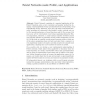Free Online Productivity Tools
i2Speak
i2Symbol
i2OCR
iTex2Img
iWeb2Print
iWeb2Shot
i2Type
iPdf2Split
iPdf2Merge
i2Bopomofo
i2Arabic
i2Style
i2Image
i2PDF
iLatex2Rtf
Sci2ools
96
Voted
EUROCRYPT
2007
Springer
2007
Springer
Feistel Networks Made Public, and Applications
Feistel Network, consisting of a repeated application of the Feistel Transform, gives a very convenient and popular method for designing “cryptographically strong” permutations from corresponding “cryptographically strong” functions. Up to now, all usages of the Feistel Network, including the celebrated Luby-Rackoff’s result, critically rely on (a) the (pseudo)randomness of round functions; and (b) the secrecy of (at least some of) the intermediate round values appearing during the Feistel computation. Moreover, a small constant number of Feistel rounds was typically sufficient to guarantee security under assumptions (a) and (b). In this work we consider several natural scenarios where at least one of the above assumptions does not hold, and show that a constant, or even logarithmic number of rounds is provably insufficient to handle such applications, implying that a new method of analysis is needed. On a positive side, we develop a new combinatorial understanding of Feiste...
Related Content
| Added | 07 Jun 2010 |
| Updated | 07 Jun 2010 |
| Type | Conference |
| Year | 2007 |
| Where | EUROCRYPT |
| Authors | Yevgeniy Dodis, Prashant Puniya |
Comments (0)

